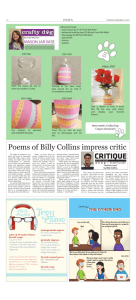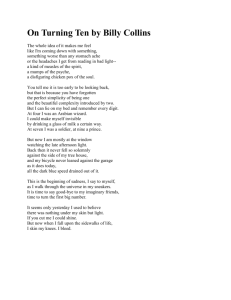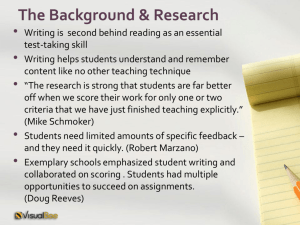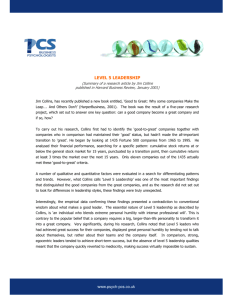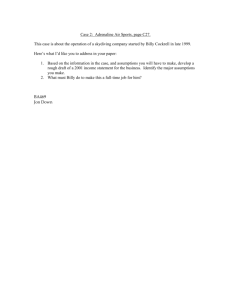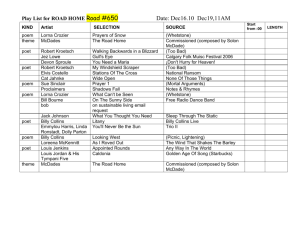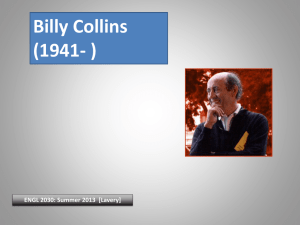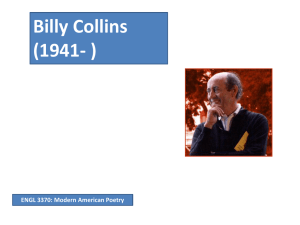File
advertisement
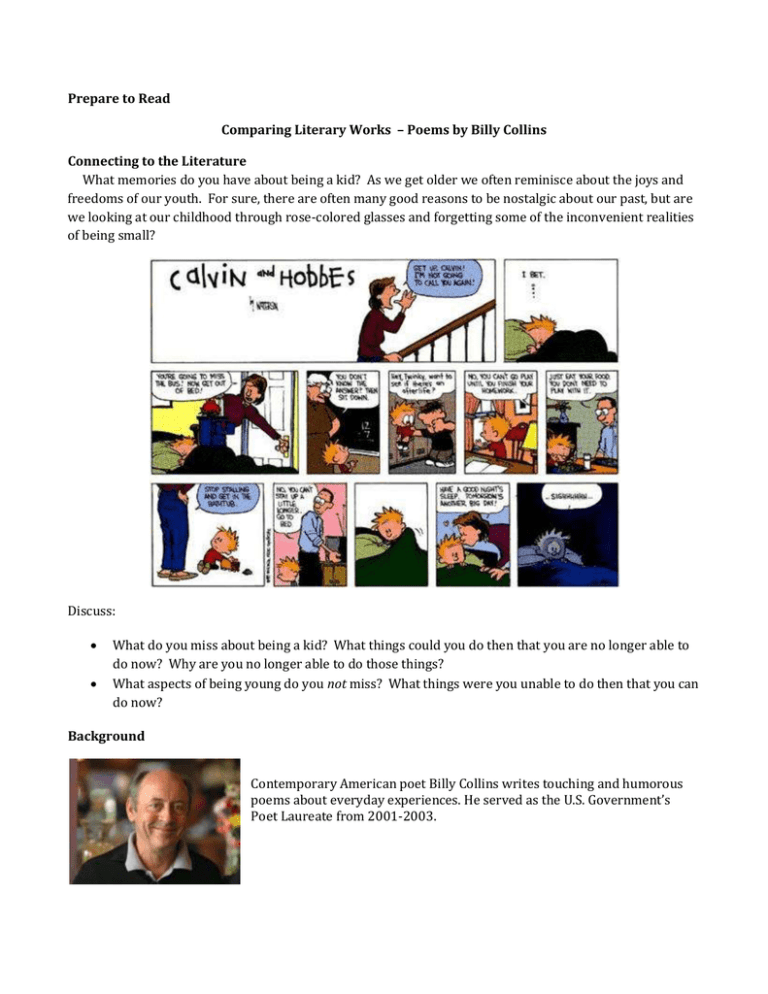
Prepare to Read Comparing Literary Works – Poems by Billy Collins Connecting to the Literature What memories do you have about being a kid? As we get older we often reminisce about the joys and freedoms of our youth. For sure, there are often many good reasons to be nostalgic about our past, but are we looking at our childhood through rose-colored glasses and forgetting some of the inconvenient realities of being small? Discuss: What do you miss about being a kid? What things could you do then that you are no longer able to do now? Why are you no longer able to do those things? What aspects of being young do you not miss? What things were you unable to do then that you can do now? Background Contemporary American poet Billy Collins writes touching and humorous poems about everyday experiences. He served as the U.S. Government’s Poet Laureate from 2001-2003. Literary Analysis Subverting clichés: Many of the ideas that Twain presents in this essay begin by echoing common clichés – overused (and therefore largely ineffective) phrases and ideas that seemingly everyone has heard a million times before. But to make this essay funny and meaningful instead of boring and obvious, Twain quickly subverts these cliché statements by adding something that goes completely against our expectations. As you read, try to identify statements and ideas that initially sound cliché before Twain twists them a bit. Satire: You will probably remember that satire is an artistic genre that frequently uses humor as a way to criticize some negative aspect of our society. Although the tools and techniques used in satire are many and varied, a few that stand out strongly in Twain’s essay are: Reading Strategy: Question Annotation Annotating is a technique that allows you to have a discussion with a text. I know that sounds silly, because you probably are saying: “Sure, I can talk to the text, but how can the text talk back to me?” Actually, a text’s “responses” to our comments and questions lie in the words and sentences that are on the page, but it is up to us to identify them. As you read these two poems by Billy Collins, write any and all questions that pop into your head – no matter what they are—into the space next to the poem’s lines. After you are done reading the poems, go back to your question annotations and see if you can find any clues within the words and phrases of the text that could be the text’s response to those questions. Vocabulary Development Psyche (n.) Repertoire (n.) Baritone (adj./n.) Disfigure (v.) Mug (n.) Invective (n.) Solemnly (adv.) Devastate (v.) Errant (adj.) Skin (v.) Fatuous (adj.) Recede (v.) Saunter (v.) Hack (n.) Banish (v.) Phase (n.) Torment (v.) Appalling (adj.) On Turning Ten – Billy Collins The whole idea of it makes me feel like I'm coming down with something, something worse than any stomach ache or the headaches I get from reading in bad light-- a kind of measles of the spirit, a mumps of the psyche, a disfiguring chicken pox of the soul. You tell me it is too early to be looking back, but that is because you have forgotten the perfect simplicity of being one and the beautiful complexity introduced by two. But I can lie on my bed and remember every digit. At four I was an Arabian wizard. I could make myself invisible by drinking a glass of milk a certain way. At seven I was a soldier, at nine a prince. But now I am mostly at the window watching the late afternoon light. Back then it never fell so solemnly against the side of my tree house, and my bicycle never leaned against the garage as it does today, all the dark blue speed drained out of it. This is the beginning of sadness, I say to myself, as I walk through the universe in my sneakers. It is time to say good-bye to my imaginary friends, time to turn the first big number. It seems only yesterday I used to believe there was nothing under my skin but light. If you cut me I could shine. But now when I fall upon the sidewalks of life, I skin my knees. I bleed. Child Development – Billy Collins As sure as prehistoric fish grew legs and sauntered off the beaches into forests working up some irregular verbs for their first conversation, so three-year-old children enter the phase of name-calling. Every day a new one arrives and is added to the repertoire. You Dumb Goopyhead, You Big Sewerface, You Poop-on-the-Floor (a kind of Navaho ring to that one) they yell from knee level, their little mugs flushed with challenge. Nothing Samuel Johnson would bother tossing out in a pub, but then the toddlers are not trying to devastate some fatuous Enlightenment hack. They are just tormenting their fellow squirts or going after the attention of the giants way up there with their cocktails and bad breath talking baritone nonsense to other giants, waiting to call them names after thanking them for the lovely party and hearing the door close. The mature save their hothead invective for things: an errant hammer, tire chains, or receding trains missed by seconds, though they know in their adult hearts, even as they threaten to banish Timmy to bed for his appalling behavior, that their bosses are Big Fatty Stupids, their wives are Dopey Dopeheads and that they themselves are Mr. Sillypants. Post-Reading: CIASE Questions: ON TURNING TEN Comprehension Who is the speaker of this poem? What is the “it” he or she refers to in line #1? Interpretation How does the speaker feel about the prospect of turning 10? Why does the speaker feel this way? What reasons are given? Analysis What kind of figurative language can you find in the poem’s first stanza? Synthesis What attributes or qualities of being a child do you think Collins wants us to reflect upon? What details make that apparent? Evaluation Has Collins created a realistic portrayal of a ten year old child? What aspects of the text match with your ideas of what a child turning ten might think, feel, or say? What aspects don’t seem to match? CHILD DEVELOPMENT Comprehension Who are the “Navajo”? Why are they mentioned? Who is Samuel Johnson? Why is he mentioned? Interpretation What is the principal difference between the way adults and children use insults or offensive language? Analysis What does the analogy in stanza #1 intend to highlight about children’s name-calling? Synthesis What attributes of being an adult do you think Collins wants us to reflect upon? What details make this apparent? Evaluation
